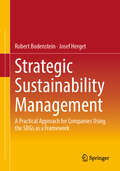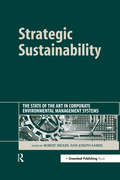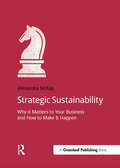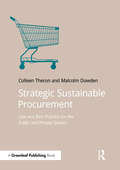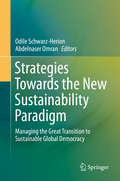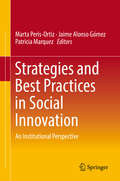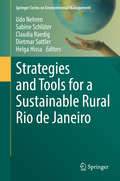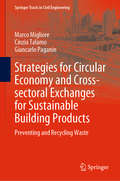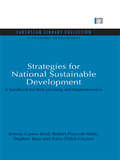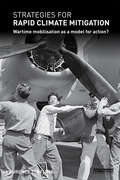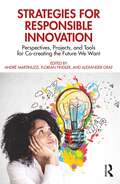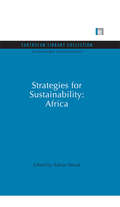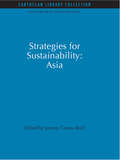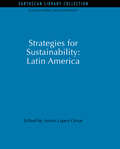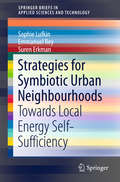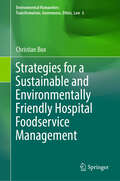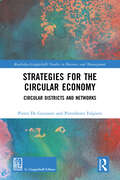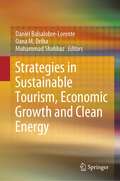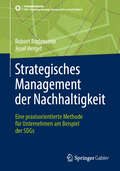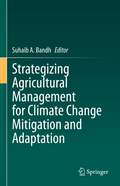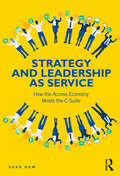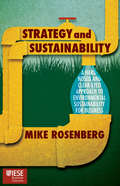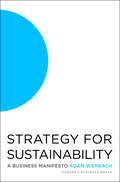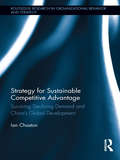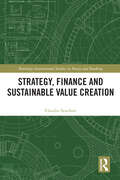- Table View
- List View
Strategic Sustainability Management: A Practical Approach for Companies Using the SDGs as a Framework
by Josef Herget Robert BodensteinThis book provides a practical guide to implementing sustainability strategies within companies. It introduces a model-based approach that enables a comprehensive, yet focused strategy, ensuring that complexity doesn’t overshadow the core objectives. The concept of Sustainability Excellence offers a versatile methodology, designed to meet the needs of both large corporations and small businesses with limited resources. The approach is adaptable to various sustainability frameworks and strategies. To demonstrate its application, the book uses the United Nations’ Sustainable Development Goals (SDGs) as a concrete example of how the method can be put into practice. Special emphasis is placed on integrating the sustainability strategy into the corporate culture, ensuring it becomes a fundamental part of the organization's DNA. The book is enriched with practical tools, including checklists and insights into the opportunities and risks of sustainability management. It is a valuable resource for managers, business owners, consultants, and anyone interested in shaping effective sustainability strategies within their organizations.
Strategic Sustainability: The State of the Art in Corporate Environmental Management Systems
by Robert Sroufe Sarkis JosephThe last decade has seen increasing awareness of the importance of understanding corporate environmental management systems (EMSs) and their relationships with sustainability, competitiveness and institutional practice. It is now assumed that most large companies have some version of an EMS in place with systems ranging from informal policies and practices to formalised third-party certified systems that are widely publicized by companies and are now integral to their strategic direction. No matter what level and type of system a firm chooses, both practitioners and researchers wish to examine and better understand the extent to which these systems are cross-functional, how they impact on performance evaluation, their capability to monitor supply chains and the life-cycles of products and services and, most importantly, whether these systems actually make a contribution to better environmental performance. This book provides intriguing insights into strategic and sustainable EMSs. It provides clear evidence of benefits that should exceed the costs (tangible and otherwise), and help practitioners understand the attributes of well-developed and strategically focused EMSs. It also demonstrates the link to performance measures such as reputation, improved position in the marketplace, cost, quality, waste reduction and numerous sustainable development-based metrics and issues. The comprehensive scope of topics spans several industries and provides environmental systems insight involving sustainable management systems, strategic and operational impacts of environmental systems, cross-country comparisons of EMS design processes and results, product-based environmental systems, EMS impacts at innovative organisations and environmental systems integration within specific industries. The book is split into three sections. First, the book covers the broad issues of planning and designing an EMS and includes topics such as performance evaluation, comparisons between multinational environmental systems, sustainable development and links between already established quality systems and an EMS. The second section focuses on EMS implementation and operation and incorporates some corporate or industry-specific case studies. The third and final category of the book highlights the use of an EMS to evaluate business processes. Strategic Sustainability will be essential reading for both managers faced with decisions regarding their own EMSs and to researchers seeking additional insights from state-of-the-art examples for further theoretical development and testing.
Strategic Sustainability: Why it matters to your business and how to make it happen (Doshorts Ser.)
by Alexandra McKayIn many businesses sustainability is one person’s passion and responsibility. A large part of their job becomes selling sustainability to other people in the business.This book offers arguments, information and tactics will help that person get the buy-in they need to move sustainability forward in their business.Strategic Sustainability: sets out why sustainability matters to businesses – the benefits to you and your stakeholders; shows how to identify the biggest issues, impacts and wins for your business; helps you identify the resources you will need to put sustainability at the heart of your business; outlines key reasons why businesses that are not multinationals should take action on sustainability, and how to do it; looks in detail at how to integrate sustainability with business strategy and mission.Sustainability is of strategic importance to a business. This book makes an airtight case for why action is essential and how sustainability can help a business not only survive but thrive in competitive marketplaces.
Strategic Sustainable Procurement: Law and Best Practice for the Public and Private Sectors (Doshorts Ser.)
by Colleen Theron Malcolm DowdenProcurement is playing an increasingly strategic role as a lever for sustainable development and social and environmental responsibility. Greater regulation on sustainable procurement in the public sector, including significant changes to the EU Directive in April 2014, are driving this change.This comprehensive guide to sustainable procurement by practising legal experts Colleen Theron and Malcolm Dowden distils key developments in EU and UK public sustainable procurement legislation, government guidance and policy; provides an introduction to sustainable procurement more broadly; provides case studies and practical examples on contractual aspects of procurement; shows you how to set up a sustainable procurement strategy; and contributes to the development of sustainable procurement policy. There is also increased emphasis on "clean" supply chains in the private sector, as best practice seeks to mesh with public sector requirements and reduce the risk that bids for public contracts might be undermined by adverse environmental impacts or social misconduct along the supply chain.Private sector companies should act now to establish best practice sustainable procurement principles to minimize the risk of litigation; several international standards are embedding the principles of sustainable procurement into their requirements.The book also offers practical examples of what sustainable procurement entails, whether the organization is bidding for public sector contracts, in need of meeting tender requirements, looking to obtain certification for a standard, or is simply seeking to improve its supply chain management and implement best practice.
Strategies Towards the New Sustainability Paradigm
by Odile Schwarz-Herion Abdelnaser OmranOn a historical global turning point, this book offers a thorough exploration of the "New Sustainability Paradigm", originally developed by the Global Scenario Group (GSG) of the Stockholm Environmental Institute (SEI) as a starting point for analyzing real-life transitions and transformations. 11 contributors from 5 continents present detailed analyses of economic and political transitions in Western and Eastern Europe, the USA, the Middle East, and in Asia, discussing the role of different players in the implementation of the New Sustainability Paradigm. Part I offers an overview of the six scenarios developed by the GSG and a short discussion of significant papers published by the Great Transition Initiative (GTI) of the Tellus Institute. Next come examples of dramatic historical and current transitions in Western Europe, the USA, Eastern Europe, the Middle East (Arabian Spring), and Asia, as well as an analysis of the potential of humankind to manage a great transition to the new sustainability paradigm. Subsequent chapters highlight the role of culture and education and review the role of different players for the implementation of the new sustainability paradigm. The focus of Part II is on the ecological pillar of Sustainability. The discussion includes urgent ecological problems including climate engineering, eco-criminality, bioterrorism, biodiversity protection, water, energy, and food security. Part III deals with needed innovations in sustainable waste management and sustainable city architecture, especially big cities in developing and threshold countries, where a significant part of the world population is concentrated. The fourth and final section offers an analysis of insights developed throughout the book, and outlines recommendations for the implementation of the New Sustainability Paradigm by civil society, grass-root movements, scholars, politically neutral NGOs, sincere media players, and by open-minded and enlightened politicians to manage and steer the Great Transition towards sustainable global democracy.
Strategies and Best Practices in Social Innovation: An Institutional Perspective
by Marta Peris-Ortiz Jaime Alonso Gómez Patricia MarquezThis book examines the different ways companies can develop and design social innovation. Combining technological and social perspectives, the contributors present emerging research on social innovation from different sectors such as entrepreneurship, education and energy. Collectively, the authors demonstrate the ways in which social innovation can drive sustainability and development in regions around the world. All societies are characterized by their political, economic and social institutions, as well as by how they utilize technology. The social innovations with the highest importance are those which modify existing institutions or create new ones, and based on their magnitude, they can be considered as radical or incremental. For example, when Joseph Chamberlain encouraged workers to organize in order to achieve universal male suffrage in Great Britain in 1885, this was a considered a radical innovation for British society, which in turn changed its political framework. Social innovations may be based on intelligence and commitment, on technology or on social entrepreneurship in its most open forms. In addition, social innovations can be classified into those which correspond to an entire country or region, a field (e.g., education) or a sector (e.g., entrepreneurship, technology, social reform). Featuring contributions on topics such as agro-food, smart cities, higher education, gender equality and sports, this book is ideal for academics, students, scholars, professionals and policy makers in the areas of innovation, entrepreneurship, sustainability and regional development.
Strategies and Tools for a Sustainable Rural Rio de Janeiro (Springer Series On Environmental Management Ser.)
by Udo Nehren Sabine Schlϋter Claudia Raedig Dietmar Sattler Helga HissaThis book is a compilation of recent developments in land, ecosystem, and water management in the Brazilian state of Rio de Janeiro. The state is located in the biodiversity hotspot of the Atlantic Forest (Mata Atlântica), a biome characterized by high biological diversity and endemism. At the same time the state of Rio de Janeiro emerged to one of the economic hubs in Latin America. This development process has been accompanied by population growth, industrialization, urbanization, as well as consumption and degradation of land and water resources. In the past years many efforts have been made to stop or at least slow down these degradation processes and restore degraded environments with the overall goal to bring together sustainable management of natural resources, nature conservation, and economic development. An overview is provided of the different strategies and tools that have been developed in the fields of agriculture, ecosystem management and biodiversity, integrated water management, land restoration, disaster risk reduction and climate change adaptation, as well as environmental governance and economic instruments. This book covers a wide spectrum from applied research to science‐policy interfaces, planning concepts, and technical tools and has a model character for other rural areas in Latin America. Target groups are scientists, practitioners, policy makers and graduate students in the field of environmental management. The different chapters are written by researchers and practitioners of the German‐Brazilian project INTECRAL (Integrated Eco Technologies and Services for a Sustainable Rural Rio de Janeiro), the rural development program Rio Rural under the state secretary for agriculture and animal husbandry, as well as invited scientists from Brazilian universities and research institutes. It bridges existing gaps between science, policies, and practice in rural development.
Strategies for Circular Economy and Cross-sectoral Exchanges for Sustainable Building Products: Preventing and Recycling Waste (Springer Tracts in Civil Engineering)
by Cinzia Talamo Marco Migliore Giancarlo PaganinThis book offers a valuable tool for understanding current efforts to promote the reuse and enhancement of pre-consumer waste in the development of new products for the construction sector, as well as the financial and regulatory tools being used to support this trend. It explores the vast and complex topic of the circular economy from the perspective of strategies for the reuse/recycling of waste, and develops a number of key premises: waste reuse/recycling must be considered using a logic of cross-sectoriality, recognizing the need to enhance the “dialogue” between different sectors; pre-consumer waste is particularly interesting for the recycling market because the construction sector can reduce its environmental impacts by enhancing its capacity to use secondary raw materials and by-products from other sectors; and lastly, the manufacturing sector is currently experimenting with promising forms of reducing/recycling pre-consumer waste and is at the same time providing by-products that can be used in other production chains. As such, the book offers a valuable asset for professionals who are interested in sustainability in construction, and in the study of construction products; however, it will be equally useful for local decision-makers tasked with implementing development policies and innovations in the industrial sector.
Strategies for National Sustainable Development: A Handbook for their Planning and Implementation (Sustainable Development Set #8)
by Barry Dalal-Clayton Stephen Bass Robert Prescott-Allen Jeremy Carew-ReidThe IUCN Strategies for Sustainable Development Handbook Series This handbook is one in a series being produced by IUCN and its partners to assist countries and communities implement Agenda 21, the action programme of the United Nations Conference on Environment and Development. The series will include handbooks on national strategies for sustainable development, local strategies, assessing progress towards sustainability, biodiversity action plans, .involving indigenous peoples, and on integrating population and resource use planning; and regular companion volumes of case studies addressing the key issues of concern to strategy implementation. Many international agreements and action plans now call for countries to undertake national strategies. These strategies seek to involve communities in united approaches to sustainable development. Some are sectoral, such as tropical forest strategies, others are thematic, covering topics such as biodiversity, education or climate change. Still others, such as national conservation strategies and national environment action plans, are evolving to become more comprehensive processes, drawing together economic, social and environmental development actions. This handbook is for people involved in strategies. It draws on experiences in different regions of the world to present options and examples of the role of strategies in sustainable development. Originally published in 1995
Strategies for Rapid Climate Mitigation: Wartime mobilisation as a model for action? (Routledge Advances in Climate Change Research)
by Laurence L DelinaTo keep the global average temperature from rising further than 2°C, emissions must peak soon and then fall steeply. This book examines how such rapid mitigation can proceed – in the scale and speed required for effective climate action – using an analogy provided by the mobilisation for a war that encompassed nations, the Second World War. Strategies for Rapid Climate Mitigation examines the wartime-climate analogy by drawing lessons from wartime mobilisations to develop contingency plans for a scenario where governments implement stringent mitigation programs as an ‘insurance policy’ where we pay for future benefits. Readers are provided a picture of how these programs could look, how they would work, what could trigger them, and the challenges in execution. The book analyses in detail one plausible approach to a crucial issue – an approach built upon knowledge of climate science and on proven and demonstrated mitigation measures. The book is meshed with a social and political analysis that draws upon narratives of mobilisations during the war to meet a transnational threat, while also addressing the shortcomings of the analogy and its strategies. The book will be of great interest to scholars, students, and practitioners of public policy, climate policy, energy policy, international relations, and strategic studies.
Strategies for Responsible Innovation: Perspectives, Projects, and Tools for Co-creating the Future We Want
by André Martinuzzi Alexander Graf Florian FindlerHow can responsible business work in the highly competitive areas of innovation? Focusing on business opportunities and illustrating how Responsible Innovation can be successfully implemented in practice, this book captures experiences and insights from key decision‑makers in business, politics, and academia, to answer this question. In addition to interviews with leading thinkers in the field, Strategies for Responsible Innovation describes the experiences of eight EU projects and provides tools for Responsible Innovation in the business sector.The examples in this book illustrate how to move from a vague societal aspiration to a business case for Responsible Innovation, and provide a compelling argument for collaboration at the important intersection between government, business, and academia. In this way, Responsible Innovation transcends a singular market-based approach to deliver value at many levels, co-creating in a truly inclusive manner. The book sheds light on the strategic benefits of applying the concept of Responsible Innovation in practice and offers concrete tools for its implementation.Aimed primarily at managers of innovation processes in organizations, and consultants and facilitators working on Responsible Innovation and sustainability management, the book also provides insight into the logic and principles of Responsible Innovation management for academics, policy-makers, and civil society organizations, helping them better communicate their requirements to business.
Strategies for Sustainability: Africa (Sustainable Development Set #9)
by Adrian WoodThe World Conservation Union, Founded in 1948, brings together States government agencies and a diverse range of non-governmental organisations in a unique world partnership over 800 members in all, spread across some 136 countries. As a Union IUCN seeks to influence, encourage and assist societies throughout the world to conserve the integrity and diversity of nature and to ensure that any use of natural resources to equitable and ecological sustainable. The World Conservation Union builds on the strengths of its members, Networks and partners to enhance their capacity and to support global alliances to safeguard natural resources at local, regional and global levels. The Strategies For Sustainably Program of IUCN works to strengthen strategic planning, policy and implementation skills aimed at sustainability development at global, national and local levels. Working with networks of strategy practitioners from member governments, partner institutions and NGOs the programme assists in the conceptual development and analysis of experience of strategies, the development of a range of strategic planning and action planning skills and improved methods of assessing human and ecosystem well being. This volume, originally published in 1996, reviews more than a decadeof experience for sustainability in 12 African countries. These countries provide examples of very different approaches to strategy development and implementation. Many have been involved in the development of the National Environmental Action Plans (NEAPs) at the request of the World Bank. Other countries have developed their strategies independently, or have prepared National Conservation Strategies withe support from the IUCN.
Strategies for Sustainability: Asia (Sustainable Development Set #10)
by Jeremy Carew-ReidIUCN – The World Conservation Union Founded in 1948 The World Conservation Union brings together States, government agencies and a diverse' range of non-governmental organizations in a unique world partnership: over 800 members in all, spread across some 136 countries. As a Union, IUCN seeks to influence encourage and assist societies throughout the world to conserve the integrity and diversity of nature and to ensure that any use of natural resources is equitable and ecologically sustainable. The World Conservation Union builds on the strengths of its members, networks and partners to enhance their capacity and to support global alliances to safeguard natural resources at local, regional and global levels. The Strategies for Sustainability Programme The Strategies for Sustainability Programme of IUCN works to strengthen strategic planning, policy and implementation skills aimed at sustainable development at global, national and local levels. Working with Networks of strategy practitioners from member governments, partner institutions and NGOs, the Programme assists in the conceptual development and analysis of experience in strategies, the development of a range of strategic planning and action planning skills, and improved methods of assessing human and ecosystem well being. Originally published in 1996, the case studies in this volume were prepared by members of the IUCN/CESP Working Group of Strategies for Sustainability in Asia, including individuals who have been closely involved in the development and implementation of the strategies, and who are from the country concerned.
Strategies for Sustainability: Latin America (Sustainable Development Set #11)
by Arturo OrnatIUCN- The World Conservation Union Founded in 1948 The World Conservation Union brings together States government agencies and a diverse range of non-governmental organisations in a unique world partnership over 800 members in all, spread across some 136 countries. As a Union IUCN seeks to influence, encourage and assist societies throughout the world to conserve the integrity and diversity of nature and to ensure that any use of natural resources to equitable and ecological sustainable. The World Conservation Union builds on the strengths of its members, Networks and partners to enhance their capacity and to support global alliances to safeguard natural resources at local, regional and global levels. The Strategies For Sustainability Programme. The Strategies For Sustainably Program of IUCN works to strengthen strategic planning, policy and implementation skills aimed at sustainability development at global, national and local levels. Working with networks of strategy practitioners from member governments, partner institutions and NGOs the programme assists in the conceptual development and analysis of experience of strategies, the development of a range of strategic planning and action planning skills and improved methods of assessing human and ecosystem well being. Originally published in 1996
Strategies for Symbiotic Urban Neighbourhoods
by Sophie Lufkin Emmanuel Rey Suren ErkmanUtilizing the results of a case study on the Gare-Lac sector in the city of Yverdon-les-Bains - the site is currently a large urban brownfield, intended to host ca. 3,800 additional inhabitants and 1,200 jobs upon completion - this work examines how to design attractive urban neighbourhoods that generate endogenous economic activity and foster socio-cultural dynamics, while moving towards local energy self-sufficiency. Exploring the different dimensions influencing energy self-sufficiency at the neighbourhood scale by integrating parameters related to buildings, infrastructure, mobility, food, goods and services, the work focuses on three scenarios (technological, behavioural and symbiotic) for the future development of this neighbourhood through 2035. The scenarios test different design strategies related to industrial symbioses, production, storage, transportation, and urban agriculture.
Strategies for a Sustainable and Environmentally Friendly Hospital Foodservice Management (Environmental Humanities: Transformation, Governance, Ethics, Law #6)
by Christian BuxSustainable catering aspires to reduce the environmental impacts of foodservice by serving nutritional, safe and environmentally friendly meals, and Italy has embraced the adoption of environmentally friendly diets and the minimization of food waste by introducing the minimum environmental criteria. However, there may be some tension between these two actions as environmentally friendly diets may lead to greater waste. The present book, in the field of the research projects entitled “Monitoring agri-food resilience and environmental savings in Puglia” and “Green supply chain management in the hospital catering service”, has the overarching purpose to improve the understanding of environmental, economic and social sustainability of foodservice, by considering the significant variables of energy efficiency, environmental impacts, waste management, customer satisfaction and user nutrition. The book reports the findings of different studies conducted in the hospital foodservice.
Strategies for the Circular Economy: Circular Districts and Networks (Routledge-Giappichelli Studies in Business and Management)
by Pietro De Giovanni Pierroberto FolgieroThis book illustrates two approaches for firms to shape successful circular strategies, namely, the Circular Economy and Circular Districts. The former considers firms’ challenges when turning theoretical circular models into practice. Thus, it discusses the opportunities and difficulties in reshaping corporate strategies by reflecting on circular economy principles. The latter approach plays a new role within the new economy systems and this book conceptualizes and operationalizes its definition. The circular district can represent an effective way to accelerate the energy transition process by developing industrial collaborations and exploiting technology synergies to enhance circularity and achieve economic, environmental, and social targets. The book highlights how firms should adjust their strategic thinking, redesign their network of relationships, and reconsider the value creation process when the circular economy is a concrete option. Furthermore, it examines the evolution from circular economy to circular districts by revealing the motivations that push firms and supply chains to redesign their strategies by considering the perspective of a circular district. The book ends by analyzing business experiences in these two areas and proposes advancements for both the scientific community and the business world. The book offers a blend of theoretical frameworks and practical applications and will be of particular interest to scholars in the fields of sustainable operations, closed-loop supply chain, green supply chain management, and circular supply chains. Also, the operationalization of the concept of circular districts, offers a genuine and original theoretical contribution, thus targeting students from Executive programs, MBA programs, and PhD programs. The book will also attract managers, practitioners and professionals interested in real-world cases and experiences as well as practical developments in the domain.
Strategies in Sustainable Tourism, Economic Growth and Clean Energy
by Muhammad Shahbaz Daniel Balsalobre-Lorente Oana M. DrihaThis book provides an in-depth analysis of and discussion about the relationship between green tourism, economic growth and globalization. It explores numerous topics relating to tourism including transport efficiency, foreign direct investment, clean energy, climate change dynamics and advances in sustainable tourism management. The book begins with discussion of sustainable tourism and economic growth, particularly focusing on management strategies. It then presents the relationship between energy use and tourism, looking at green energy and energy shock. It then discusses transport efficiency, tourism efficiency and financial growth in both developed and developing countries. This book is of interest to researchers, policymakers, and postgraduate students in the areas of energy, environmental and tourism economics.
Strategisches Management der Nachhaltigkeit: Eine praxisorientierte Methode für Unternehmen am Beispiel der SDGs (SDG - Forschung, Konzepte, Lösungsansätze zur Nachhaltigkeit)
by Josef Herget Robert BodensteinDieses Buch setzt sich mit der konkreten Umsetzung von Nachhaltigkeitsstrategien in Unternehmen auseinander. Damit die Strategie wirkungsvoll umgesetzt werden kann, wurde eine modellbasierte Methode entwickelt, die einen ganzheitlichen Ansatz ermöglicht, ohne dass die Komplexität den Blick für das Wesentliche verstellt. Das vorgeschlagene Konzept der Nachhaltigkeits-Exzellenz stellt eine Vorgehensweise zur Verfügung, die sowohl Herausforderungen in großen Unternehmen als auch begrenzte Ressourcen in kleinen Unternehmen berücksichtigt. Die entwickelte Methode eignet sich für alle gewählten Konzepte zur Nachhaltigkeit. Die praktische Umsetzung der vorgestellten Methode wird am Beispiel der Sustainable Development Goals (SDGs) der Vereinten Nationen (UN) konkret dargestellt. Die Integration der Nachhaltigkeitsstrategie in die Unternehmenskultur erhält eine besondere Betrachtung. Abgerundet wird das Werk mit zahlreichen Checklisten sowie Hintergrundinformationen zu Chancen und Risiken des Managements von Nachhaltigkeit in Unternehmen. Das Buch richtet sich an Manager, Eigentümer, Berater und alle, die an Strategien zur Nachhaltigkeit in Unternehmen interessiert sind.
Strategizing Agricultural Management for Climate Change Mitigation and Adaptation
by Suhaib A. BandhThis volume aims to raise awareness and stimulate research on how agricultural management could help to mitigate climate change impacts, and focuses on technical progressions and innovations in climate change mitigation and adaptation. It addresses new innovations in agricultural technology and management with the goal of balancing agricultural production and its associated climate effects in a sustainable manner. The major topics covered include crop and soil management, techniques and technologies for emission reduction, irrigation, land degradation, pest and disease management, farmers' perspectives, and climate-smart agriculture policy. The book is geared towards students, researchers, and professionals in the fields of environmental science, agriculture science, and climate change.
Strategy and Leadership as Service: How the Access Economy Meets the C-Suite
by Sara DawStrategy and Leadership as Service isn’t just a nice idea; it is a practical, alternative vision of the future of work for senior executives that is starting to gain significant interest and is being adopted by businesses globally. Disrupting and challenging the traditional full-time employment model, the Strategy and Leadership as Service framework provides businesses with access to the complete range of functional, emotional, and collective intelligence at the C-suite level by moving their positions from the “pay-roll” to an “access-role.”Many entrepreneurial and growing businesses don’t need, don’t want, and can’t afford full-time C-suite executives. For larger organisations, it is becoming harder to find the skills and knowledge required to fulfil all the obligations of a functional C-suite with a fixed group of individuals. By moving to the Strategy and Leadership as Service framework, the outcomes are better for all stakeholders: more engagement, access to the right skillsets and mindsets at the right time and in the right quantity to match the changing business agenda, more flexibility for senior leaders, and strengthened risk management. Through presenting a working business model, and real-world case studies throughout, this book provides executives and leaders with a complete understanding of this ground-breaking approach and its key benefits, the theory upon which it is based, its essential ingredients, the mindset change required and, most importantly, how to apply it in practice.The book provides business leaders, C-suite portfolio executives, human resource professionals, strategy consultants, leadership coaches, organisational development consultants, recruiters, professional service firms, academics, and forward-thinking business students with a radical new view of how the access economy can be applied to business strategy and leadership for more sustainable futures.
Strategy and Sustainability: A Hardnosed and Clear-Eyed Approach to Environmental Sustainability For Business (IESE Business Collection)
by Mike RosenbergBusiness and environmental sustainability are not natural bedfellows. Business is about making money; sustainability is about protecting the planet. Business is measured in months and quarters; sustainability often requires significant short term costs to secure a sometimes uncertain long-term benefit. To some activists, all executives are exploitative, selfish “1 percenters”. To some executives, all activists are irresponsible, unyielding extremists.And yet engaging with the issue isn’t optional – all businesses must have a strategy to deal with sustainability and, like any strategy, this involves making choices. Strategy and Sustainability encourages its readers to filter out the noise and make those choices in a hard-nosed and clear-eyed way. Rosenberg’s nuanced and fact-based point of view recognizes the complexity of the issues at hand and the strategic choices businesses must make. He blends the work of some of the leading academic thinkers in the field with practical examples from a variety of business sectors and geographies and offers a framework with which Senior Management might engage with the topic, not (just) to save the planet but to fulfil their short, medium, and long-term responsibilities to shareholders and other stakeholders.
Strategy for Sustainability
by Adam WerbachThe definitive work on business strategy for sustainability by the most authoritative voice in the conversation.More than ever before, consumers, employees, and investors share a common purpose and a passion for companies that do well by doing good. So any strategy without sustainability at its core is just plain irresponsible - bad for business, bad for shareholders, bad for the environment. These challenges represent unprecedented opportunities for big brands - such as Clorox, Dell, Toyota, Procter & Gamble, Nike, and Wal-Mart - that are implementing integral, rather than tangential, strategies for sustainability. What these companies are doing illuminates the book's practical framework for change, which involves engaging employees, using transparency as a business tool, and reaping the rewards of a networked organizational structure.Leave your quaint notions of corporate social responsibility and environmentalism behind. Werbach is starting a whole new dialogue around sustainability of enterprise and life as we know it in organizations and individuals. Sustainability is now a true competitive strategic advantage, and building it into the core of your business is the only means to ensure that your company - and your world - will survive.
Strategy for Sustainable Competitive Advantage: Surviving Declining Demand and China's Global Development (Routledge Research in Organizational Behavior and Strategy)
by Ian ChastonDue to the adverse outcomes of the recent global recession and the public deficit crisis in the USA and Europe, Western companies can expect flattening or declining sales in their domestic markets. They will also face growing competition as Chinese firms seek to block the activities of foreign companies in their domestic market and expand their own operations in overseas markets. Survival and growth for Western companies is unlikely to come from sustaining current business practices based upon utilization of conventional approaches to strategic management; success will depend on exploiting new knowledge to stay ahead of competition. This book examines the strategic issues associated with the entrepreneurial utilization of new knowledge to create innovative products and services, accompanied by the development of leading edge, highly productive internal organizational processes. Through the use of appropriate theories and illustrative case examples, the text is designed to assist managers in Western organizations and business school students understand how to counter the increasing threats that are posed by the globalization of companies from emerging countries such as the BRIC nations.
Strategy, Finance and Sustainable Value Creation (Routledge International Studies in Money and Banking)
by Claudio ScardoviStrategy and finance are generally viewed as two separate subjects. Once regarded with fascination, they have become the subject of strong criticism, the first considered too theoretical and long term to be of any use and the second too speculative and short term to contribute to value creation. This book argues, however, that strategy and finance are in fact value twins, both of which need a thorough overhaul, from their toolkits to their end goals. The author contends that we rely on strategic and financial frameworks that were developed decades ago, but, in an increasingly complex and risky environment, these need to undergo a profound transformation, one that follows an intertwined approach, enabling companies to achieve the twin goals of value creation and sustainability consistently and successfully.The book provides a fresh and innovative view of strategy and finance. It discusses the concept of strategy extensively, examining its history, application, and importance in modern business. It also explores how strategy has evolved and how it can be adapted to better serve companies in a rapidly changing business landscape. The book emphasizes the role of finance in corporate strategy, suggesting that it is a crucial element in achieving sustainable business success, and explores how financial tools and concepts can be integrated with strategic planning to drive growth and value creation. Further, it investigates how strategic and financial planning can be used to manage business risks effectively. Readers are given useful insights via the inclusion of case studies from numerous industries, including corporations, banks, and wealth and asset managers; these real-world examples serve to close the gap between theory and practice.
